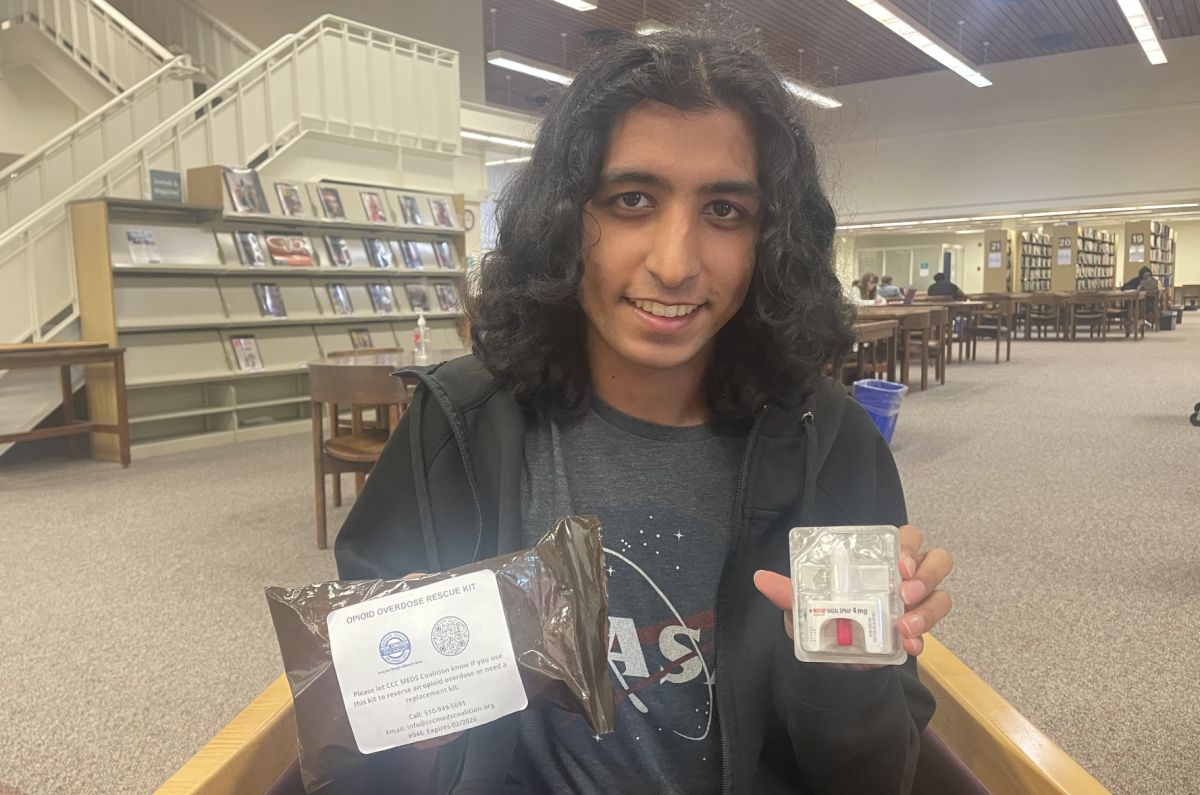Diablo Valley College last month hosted the first in a series of online trainings to educate students and faculty about opioid overdose prevention, and provided instruction in the use of the emergency drug Naloxone, better known under its brand name Narcan.
Todd Farr, program manager of Student Life and advisor to the Associated Students of Diablo Valley College (ASDVC), helped lead the project since its inception in July. He said the goal is to help better prepare people on campus in the event of an overdose when they might need to save someone’s life.
“It’s an opportunity for us to get educated on a very important epidemic that we are experiencing,” said Farr in an interview with The Inquirer, “and to learn how we respond and what we can do to save lives.”
Attendees who complete one of the trainings receive access to Narcan free on campus, as well as a Certificate of Completion in Opioid Overdose Rescue Training. The Student Life Center is recording the names and emails of attendees, and has prepared batches of “life saving kits” that include two doses of Narcan each, which students, faculty and staff can use once they’re qualified to provide emergency aid.
The novel program, which DVC initiated in partnership with Contra Costa County’s Medication Education and Disposal Safety Coalition (MEDS), comes at a pivotal moment in the nation’s struggle with the opioid crisis. Annual opioid-related deaths quadrupled over the last decade, rising from just over 21,000 overdose fatalities in 2010 to more than 80,000 in 2021, according to the National Institute on Drug Abuse.
This year alone, Contra Costa County has reported 295 overdoses — five of them fatal. Of those 295 overdoses, 141 people were saved with Narcan treatment, according to county officials.
One of the key people behind the project, who helped get it off the ground, is DVC sophomore Humza Madinawala. Madinawala,19, who studies economics, said the initiative started as a group midterm assignment that he and four other students — Mia Mink, Ana Hernandez, Lorraine Pracale and Jon Boes — helped organize as part of their Small Group Communications class last spring.
After considering numerous issues they could address with a solutions-based response, Madinawala said, there was “a general consensus within the group that this was definitely what we wanted to do.”
But formulating a plan to get Narcan distributed on campus, and turning that class project into a county-coordinated program, was a feat he and his colleagues didn’t expect to accomplish in such a short period.
“Honestly, I’m surprised by how fast this moved,” he said, “because there were definitely points where you just don’t know if it’s actually going to happen.”
Now, seeing a new overdose prevention program suddenly take root on campus is a gratifying experience that he said he’s “elated” to have been part of.
“I’m glad our work has helped bring further awareness to Narcan,” Madinawala said, adding, “this access and promoting education could prevent people from dying.”
Attendees of last month’s event were shown different examples of commonly misused prescription opioids, including the synthetic opioid fentanyl, which in 2022 was responsible for over two-thirds of overdose deaths in the US.
The deadly painkiller, which was only FDA approved for treating severe cases such as cancer, has been the main driver in the spike of opioid overdoses over the course of the past two years. Although prescription rates of fentanyl have dropped, illicit production of the drug has boomed, with the DEA reporting that in the last year, six out every 10 pills seized and tested by the federal government contained a potentially lethal amount of fentanyl.
One of the event’s presenters, Mariella Sanding, a MEDS Coalition coordinator, explained that any drug bought from an illegal source has the potential to be laced with fentanyl. She said individuals carrying doses of Narcan — and having the drug freely available on campus — can reduce the risk of tragic death by overdose.
“One pill can kill,” Sanding said. For that reason, she added, “always have a plan.”
The event covered specifically how to address an emergency situation where someone may need to use Narcan to save a life. Narcan’s packaged version of Naloxone, which was approved by the FDA for over-the-counter sale in March, comes prepared as a nasal spray. The spray is applied inside the nostril and comes with two doses, in case the first one doesn’t provoke a response from the person overdosing.
Training DVC students and staff in the application of the overdose treatment could have real-world impacts. Put simply, said Farr, “it’s a way to educate and mobilize our community to save lives.”
DVC’s opioid overdose prevention program will host three more monthly sessions during the semester to train people in the use of Narcan. The next event dates are Oct. 6, Nov. 3, and Dec. 1. Registration details can be found on the school’s calendar or here.
After seeing the program launch this fall, Madinawala said he wants to see it spread to more college campuses.
“I do hope that others see what we’ve accomplished here,” Madinawala said, “and recognize that the best time for this is now.”






































































Umair • Oct 16, 2023 at 11:47 am
Way to go Humza and team. Great work which will change so many lives for the better.
Lubna • Oct 11, 2023 at 9:00 pm
A big step in saving lives! More awareness and education is needed to combat this leathal and life threatening drugs. Bravo! To Hamza Madinawala and his team. Great work!
Tiaira Shantel • Oct 5, 2023 at 8:10 am
I work at a methadone clinic and I think this is amazing!! PLEASE CONTINUE TO EDUCATE!!! WAY TO GO HUMZA
Maddie • Sep 28, 2023 at 7:15 pm
Go Humza!!!!!